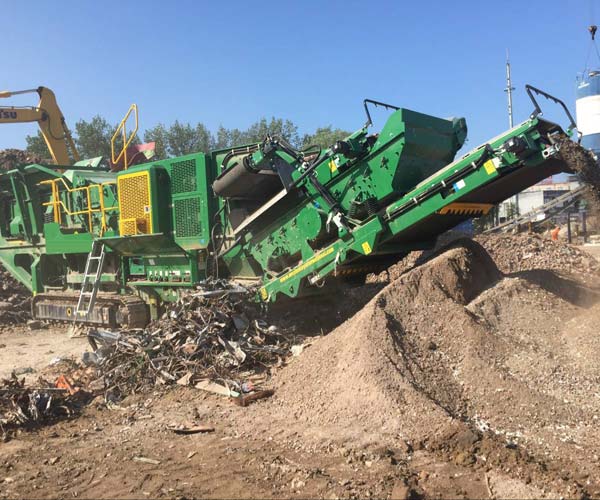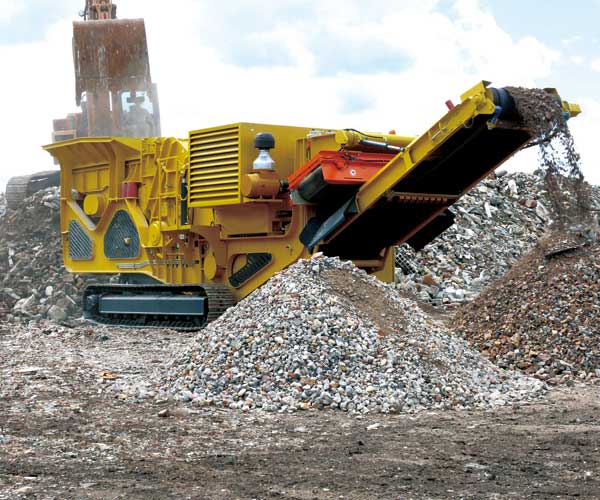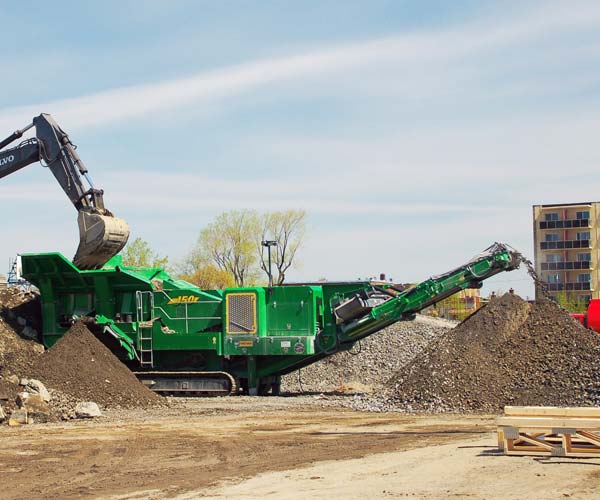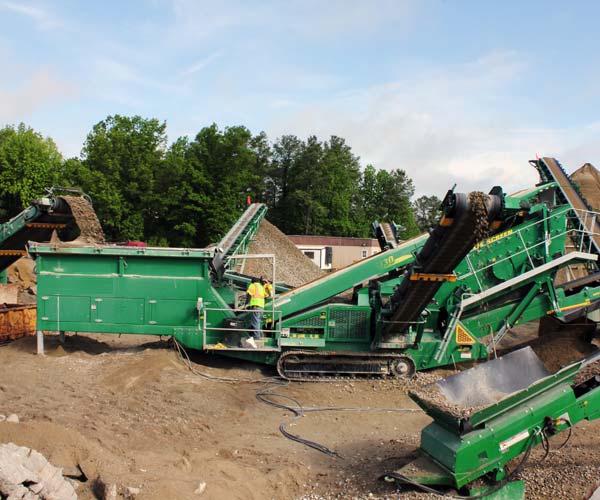
Mobile concrete crushers have transformed the construction industry by providing an eco-friendly solution for on-site concrete waste recycling. The crushing process, involving feeding, primary crushing, screening, and optional metal separation, allows contractors to repurpose concrete debris into valuable aggregates.
24 Online Service

In the world of construction and demolition, technological advancements have revolutionized the way we approach projects. One such innovation that has taken the construction industry by storm is the mobile concrete crusher. Unlike traditional stationary crushers, this cutting-edge equipment offers a new dimension of mobility and flexibility, enabling it to be easily transported to different job sites.
A mobile concrete crusher is a specialized machine designed to crush and recycle concrete from demolition sites into reusable aggregates. This equipment utilizes powerful jaws, hydraulic mechanisms, and sturdy conveyor systems to break down concrete structures into smaller pieces. The resulting crushed concrete can be used as a foundation material for roads, pavements, and various construction projects, reducing the need for new aggregates and minimizing environmental impact.
The primary distinction between mobile concrete crushers and traditional stationary crushers lies in their mobility and adaptability. Stationary crushers are fixed at a specific location, usually in a quarry or mining site, and are suited for high-capacity crushing operations. On the other hand, mobile concrete crushers can be transported to different job sites, including urban areas, construction sites, and remote locations. This mobility advantage opens up new opportunities for construction projects and facilitates the recycling process by reducing transportation costs.
One of the most significant advantages of mobile concrete crushers is their ability to process concrete directly at the demolition or construction site. This eliminates the need to haul concrete debris to a fixed crusher, resulting in substantial time and cost savings.
Mobile concrete crushers are designed for quick setup and dismantling. Their compact and lightweight design enables contractors to move the equipment from one location to another with ease, accelerating the project timeline and increasing overall efficiency.
By recycling concrete on-site, mobile crushers contribute to sustainable construction practices. They reduce the environmental impact of transportation, save energy, and decrease the consumption of natural resources required for producing new aggregates.
These crushers can handle various types of concrete, including reinforced concrete and asphalt. Their adaptable nature allows them to crush different materials, making them ideal for diverse construction projects.
Unlike stationary crushers, mobile concrete crushers do not require a dedicated installation. They can be set up on the project site, making them suitable for projects with limited space and access constraints.
With the ability to crush concrete on-site and produce reusable materials, mobile crushers significantly cut down on disposal and transportation costs. Additionally, the reduced need for new aggregates contributes to overall cost savings.
The rapid mobilization and flexibility of mobile concrete crushers enable construction teams to keep pace with tight schedules and meet project deadlines more efficiently.

The construction industry plays a pivotal role in shaping our modern infrastructure. While it brings about remarkable advancements and economic growth, it also leaves behind a substantial environmental footprint in the form of construction waste. This waste, if not managed responsibly, can pose severe threats to our planet’s well-being. Therefore, it becomes imperative for the construction industry to embrace sustainable practices, with construction crushing and recycling emerging as a key solution. By recycling construction waste, particularly concrete waste, we can significantly mitigate environmental impacts, reduce landfill usage, and conserve precious natural resources.
Construction activities generate vast amounts of waste, encompassing concrete, wood, metals, plastics, and more. Among these, concrete stands out as one of the most ubiquitous construction materials, used in roads, buildings, bridges, and countless other structures. However, when these structures reach the end of their lifespan or undergo demolition, they contribute to the mounting problem of construction waste.
The repercussions of uncontrolled construction waste are manifold. Landfills, already overburdened with various forms of waste, receive an influx of construction debris. This not only consumes vast areas of land but also emits harmful greenhouse gases and leachates that can contaminate soil and water sources. Moreover, the process of extracting and manufacturing concrete involves significant energy consumption and carbon emissions, thereby exacerbating the industry’s overall environmental impact.
To address the environmental crisis posed by construction waste, recycling must become an integral part of the construction industry’s practices. Recycling construction waste brings a plethora of benefits, both for the environment and the industry itself. One of the primary materials that can be recycled from construction waste is concrete.
Recycling concrete waste diverts a substantial portion of it from ending up in landfills. By doing so, we can alleviate the pressure on landfill sites and extend their lifespan, giving us more time to find long-term solutions for waste management.
The process of recycling concrete waste involves crushing it into smaller particles and reusing it as aggregates in new concrete mixes. By using recycled concrete aggregates, we can reduce the demand for fresh aggregates sourced from quarries. This helps conserve natural resources like sand, gravel, and stone, which are otherwise finite and non-renewable.
The production of new concrete requires significant amounts of energy and leads to considerable carbon emissions. On the other hand, recycling concrete consumes less energy and results in reduced greenhouse gas emissions. By choosing recycled concrete aggregates, the construction industry can play a vital role in combating climate change.
Recycling construction waste, including concrete, can lead to cost savings for construction companies. Disposing of waste in landfills often comes with disposal fees, while recycling can provide a more cost-effective alternative, thereby contributing to the industry’s profitability.
Embracing recycling in the construction process allows companies to portray themselves as environmentally responsible and sustainable entities. This can enhance their reputation, attract environmentally conscious clients, and open doors to new business opportunities.
By recycling concrete waste, the construction industry can integrate itself into the circular economy model. This entails creating a closed-loop system where materials are continuously reused, minimizing waste generation and promoting sustainable growth.

The construction industry has been revolutionized by the advent of mobile concrete crushers. These versatile machines have become essential tools in the field of on-site recycling, enabling contractors to crush and repurpose concrete waste into valuable materials.
Mobile concrete crushers function on the principle of reducing large rocks and concrete debris into smaller, more manageable pieces. The process involves a combination of crushing mechanisms that generate high levels of force to break down the concrete into reusable aggregates. The key stages of the crushing process include:
Concrete chunks are fed into the mobile crusher through a vibrating feeder. This ensures a continuous and controlled flow of material to the crushing chamber.
Within the crusher, a set of steel jaws or cones act as the primary crushing mechanism. The concrete is compressed between these jaws, and the intense pressure breaks it down into smaller fragments.
Once the concrete has been crushed to the desired size, a screening unit separates the aggregates based on their dimensions. This allows for the removal of any oversized particles and ensures uniformity in the final product.
Mobile concrete crushers are equipped with conveyor belts that transport the crushed material from one stage to another. This automated process enhances efficiency and reduces the need for manual intervention.
In some cases, mobile crushers are equipped with magnets to remove any metal debris from the crushed concrete. This is particularly useful in recycling applications, as it helps ensure the production of clean and uncontaminated aggregates.
Mobile concrete crushers are designed to be transported to and operated at various worksites, making them extremely versatile for on-site projects. The following are the key features that facilitate their efficient operation:
As the name suggests, these crushers are mounted on wheels or tracks, enabling easy movement from one site to another. This mobility eliminates the need for separate transportation of concrete waste and significantly reduces costs.
Most modern mobile concrete crushers come with remote control capabilities. Operators can control the machine from a safe distance, adjusting the settings, and monitoring the process in real-time.
Mobile crushers can be powered by diesel engines or electricity, offering flexibility to operate in remote areas without access to a power grid.
Mobile crushers are designed to be compact and lightweight without compromising on performance. Their smaller footprint allows for easy maneuverability even in confined spaces.
These crushers are equipped with a fixed jaw and a movable jaw, which together compress the concrete against a stationary surface. Jaw crushers are versatile and can handle various types of materials, making them suitable for primary crushing applications.
Impact crushers use impact force to break down concrete, with the help of hammers or blow bars that strike the material at high speed. They are particularly effective for recycling applications involving softer materials.
Cone crushers operate on the principle of compression crushing, where a concave surface and a rotating mantle squeeze the concrete, producing finer aggregates. Cone crushers are best suited for secondary and tertiary crushing.
VSI crushers use a different approach by throwing the concrete against a hard surface, such as a rock or a metal plate, to break it down. These crushers are highly efficient and produce well-shaped aggregates.
Our Projects
Copyright © ZENITH, All Right Reserved.
